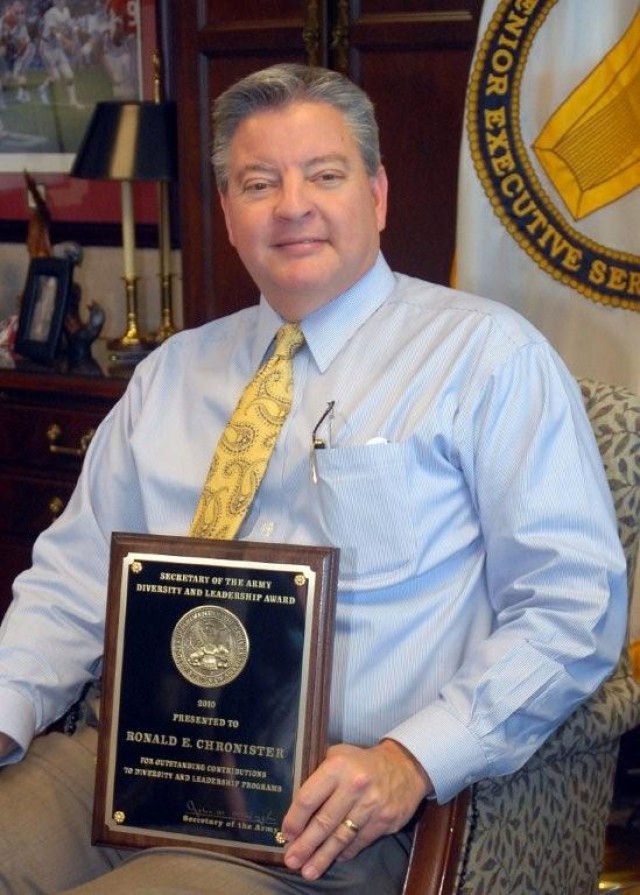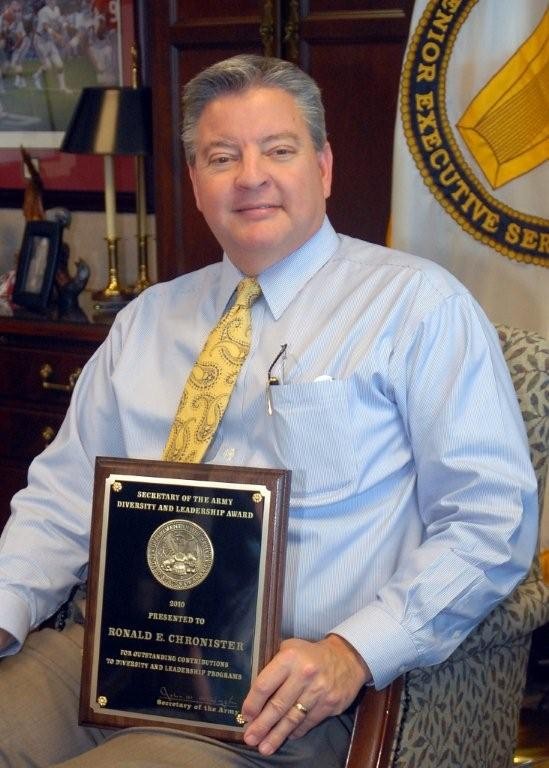
REDSTONE ARSENAL, Ala.--For Ronnie Chronister, it's all about balance.
From the way a person lives their life to the type of employees who work in an office, Chronister believes balance should rule the day.
And the Army agrees.
Chronister, deputy commander of the Aviation and Missile Command, was recognized recently for the balance he has brought to AMCOM in terms of diversity and leadership in equal employment opportunity. In an awards program March 15 at the Pentagon, Chronister received the Secretary of the Army Diversity and Leadership Award.
"This really is a recognition of the great work this command does," Chronister said. "Bob (Coney of AMCOM's Equal Employment Opportunity Office) and his staff, and all the different organizations here at AMCOM embrace the concepts of diversity and equal opportunity."
The AMCOM deputy was among 16 Army workers recognized during the Secretary of the Army awards ceremony. Another recipient with ties to AMCOM was Kresten Cook, deputy commander for maintenance operations at Corpus Christi Army Depot, Texas, who received the Small and Disadvantaged Business Utilization Award.
Chronister said two command programs - an educational outreach program that encourages employee participation in local school programs and a summer student employment program aimed at introducing an educationally diverse group of high school and junior college students to federal employment - brought his nomination, submitted by Coney, to the attention of Army secretary John McHugh.
The ceremony was conducted by undersecretary of the Army Dr. Joseph Westphal with Army Materiel Command commander Gen. Ann Dunwoody in attendance.
"It was a first-class ceremony. The Army staff did a phenomenal job," Chronister said. "It was a good day for Team Redstone. I was a little surprised by the whole thing."
Besides AMCOM's two educational programs, Chronister was also recognized for "his support and commitment to integration of equality employment opportunity ... (that) contributed significantly to enhancing the future readiness of the command and the U.S. Army.
"His commitment and recognition of the importance of senior leader involvement, inclusiveness and community outreach regarding Army transformation, diversity strategies and equal employment opportunity have resulted in increasing awareness, education and understanding of the Army by educational leaders and students at all levels and sets an example of diversity leadership for other senior leaders, managers, supervisors and employees."
A graduate of the Army Materiel Command Intern Training Center, Chronister, a civil engineer, has served as the AMCOM deputy since 2008. Previously, he held several positions at the Aviation and Missile Research Development and Engineering Center, where he worked to establish the Prototype Integration Facility. He served as the executive director of AMCOM's Integrated Materiel Management Center before being promoted to AMCOM deputy. He joined the Senior Executive Service in October 2005.
In all the positions he's held, Chronister has strived to emulate the good leaders who have mentored him and who he has looked up to.
"I really think to be an effective leader, and it's a philosophy I employed before coming here, you have to pay attention to diversity," he said. "I think it is vitally important, especially as a civil servant, and that you have a responsibility to society to have diversity in employees who can excel, enjoy federal employment and have a great career. A good leader pays attention to that."
In regard to employee gender, race, ethnicity, age, education and other diverse characteristics, Chronister said every federal government organization should strive for balance in the workplace because of the benefits it brings to the organization.
"In a diverse work force, you have people who have different opinions, who think differently, who have different perspectives," he said. "As a leader, I want all the different perspectives, all the different inputs. If you only hear from one sector, it negatively affects your ability to lead and to make good decisions."
But working toward the right balance in diversity can be difficult. It should also be a career-long goal.
"To be balanced you have to know where your EEO weaknesses are and what your capabilities are," he said. "You have to be able to ask the question 'What is out of balance'' I don't think you're ever through or at a point where you are satisfied. Diversity is always a challenge. And success in one area means you need to move on to a different category."
Diversity is especially important when developing the next generation of leaders to ensure those leaders represent the balance of diversity that should be mimicked throughout an organization. Chronister likes leadership to thrive within AMCOM at all levels and among all diverse populations.
"From a personal perspective, we all have the opportunity to exhibit leadership characteristics," Chronister said. "Employees who want to learn their jobs, who bring a technical foundation to the workplace, who share their skills and knowledge for the betterment of all - they are all leaders. And as they progress in their careers, they should be exposed to opportunities for leadership development."
Mentoring, formal leadership training, on-the-job leadership opportunities and taking on leadership roles in professional groups - all are ways to develop the future generation of leaders.
"Our current leadership has got to do a better job of developing the skill set of future leaders," Chronister said. "Ninety percent of the challenges we face today are leadership based. We have to do a better job of growing leaders."
As leaders strive to create diversity in the work force, employees should also strive to create diversity in their work experience and skills.
"Career paths don't always go from Point A to Point B. Sometimes they go sideways or they are crooked," he said. "A diverse career augments an employee's abilities. It is rare that you grow up in an organization that you lead one day. It's OK to leave and take diverse assignments, to get out of your comfort zone and try different things. That's the way you develop and use leadership skills."
Employees should also seek out mentors that can provide them with constructive criticism on their career path, and they should learn how to build relationships at work, in the community and on a personal level.
"You need to know how to lead in different situations. How do you influence others that you don't have any authority over''" Chronister said.
The AMCOM deputy said he still has mentors who he goes to for advice and counsel. Two of those mentors - now retired AMCOM commander Maj. Gen. Jim Myles and current AMCOM commander Maj. Gen. Jim Rogers - "have taught me a lot about leadership and about being the kind of man I want to be."
Good leadership is dependent on the credibility a leader has with their work force. Leaders who have credibility will be followed, he said. But developing that credibility comes by caring about employees and their careers, which takes Chronister back to his comments on leadership development.
"We have to give our employees the opportunity to develop so they can compete for career goals," he said.
That can be difficult, however, as AMCOM and the Army face budget cuts, in a time when concerns are primarily focused on supporting the war fighter.
"We have been very tactically focused, very war fighter focused, as we should be," Chronister said. "But we've lost a little bit of the focus on work force development. One of our strengths has been work force development and leadership, and we need to keep growing that. I am a proponent of pushing that down to the next line supervisor and the next line."
He also encourages leaders and managers to develop strategies for work force development that include one-on-one sessions between leaders and employees, regular performance appraisals and award programs. As leaders focus on work force development, their employees can be tactically focused, bringing a balance to the workplace, he said.
"A good leader is not self-serving. If they are, then they are not a leader," Chronister said. "They should be serving their work force and, when there is recognition, like this award (from the secretary of the Army) the work force should look at it as their award as well."

Social Sharing